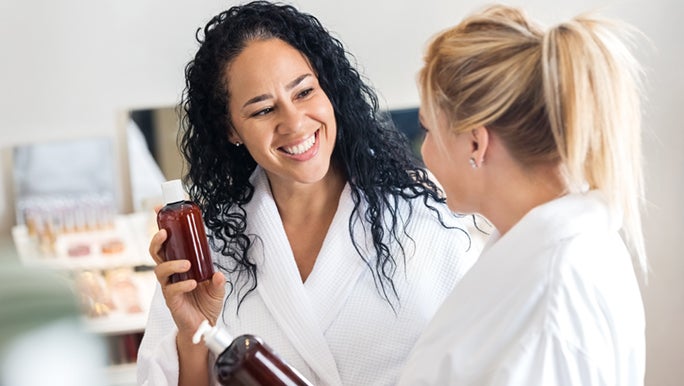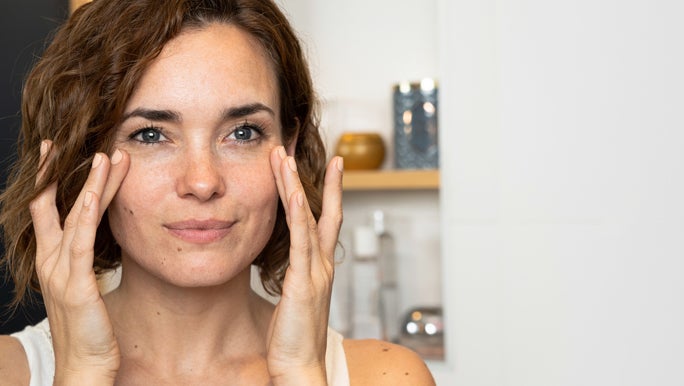We often think of acne as just a teenage issue, but it also affects adults. Unsurprisingly, those breakouts can create real issues when you want to look and feel your best.
So we asked Consultant Dermatologist Dr Shreya Andric about what causes adult acne and whether she had any recommendations for natural ways to get rid of it.
What causes acne breakouts in adults?
If you have a teenager with pimples, you’ll probably be familiar with the main cause of acne:
- Hormone levels trigger excess oil production in the skin’s sebaceous glands.
- The pores become clogged with dead skin cells.
- Bacteria get trapped in the clogged pores.
- The bacterial infection results in inflammation.
According to Dr Shreya, these same steps lead to acne breakouts in adults. But being an adult comes with its own extra layer of acne causes, including:
- Changes in both male and female hormones, including menstrual cycle hormones, create a pH imbalance and excessive oil production in oil glands.
- Stress can make your body produce more cortisol, which causes oil imbalances in your skin.
- Hair products can clog up the pores along where your hair follicles meet your forehead
- Incorrect skincare or makeup products can irritate your skin.
- Dirty makeup tools can increase your exposure to bacteria.
- A diet that’s high in sugar and fatty foods can be associated with acne in adults.

Hair products can clog up the pores along your hairline.
The symptoms of adult acne
Usually located on your face, forehead, chest, upper back or shoulders, adult acne can show up in different ways:
- blackheads - open comedones
- whiteheads - closed comedones
- papules - hard, clogged pores that feel tender
- pustules - similar to papules but filled with pus
- nodules - swollen pores deeper in the skin
- cysts - the largest form of acne, red or white bumps that are often painful
shop products for clear skin
8 tips for preventing acne in adults
Dr Shreya recommends treating adult acne the same way you’d treat teenage breakouts. This means you need to:
- Cleanse regularly: make sure your cleanser contains salicylic acid, which can help chemically exfoliate your skin and help to keep your pores clear.
- Use the right hair products: choose products that will help you to look after your hair while keeping the pores along your hairline free and unclogged.
- Moisturise thoroughly: Dr Shreya says that moisturising is still important, but you should look for moisturisers that state they are ‘oil-free’ and ‘non-comedogenic’ (which means they should not clog your pores).
- Eat well: include foods with plenty of zinc and omega-3 fatty acids. For ideas, learn about the top 10 foods that will give you healthy hair, skin and nails
- Use over-the-counter acne products: you can treat mild acne with topical anti-acne solutions including pimple patches, anti-acne skin care and spot treatments – ask your pharmacist about the right one for your skin and symptoms.
- Reassess your skincare products: see whether any of them seem to trigger major breakouts. Your skin also changes depending on your life stage, so you may need to change products from time to time.
- Clean your makeup tools: use your facial cleanser to clean brushes and sponges to keep them free from the bacteria and dead skin particles that can clog your pores.
- Use a non-oily sunscreen: sunlight is one of the most common causes of skin damage, so wearing sunscreen will also help you to look after your skin.

Eat well: Include foods with plenty of zinc and omega 3-fatty acids. For ideas, learn about the Top 10 foods that will give you healthy hair, skin and nails.
When should you seek professional help?
If your breakouts don’t respond to a good cleansing routine and topical acne creams, you should consider seeing a GP or a dermatologist for help to treat acne.
“We can treat more severe acne with prescription medications,” Dr Shreya explains. A health professional can also recommend the best treatment for skin conditions like cystic acne.
However, she cautions that stubborn or sudden adult acne can also be a symptom of a bigger issue. In this case, she recommends talking to your GP, who’ll know what to check for.
Her key message is to remember that in most cases, adult acne isn’t something you’re stuck with. There are ways to treat it – starting with understanding the causes and following our suggestions above, then perhaps getting help if you need it.
Related:
Dr Shreya Andric is a Fellow of the Australian College of Dermatologists with a wide breadth of general dermatology knowledge as well as specialist interest in areas of cosmetic dermatology, paediatric dermatology and genital dermatology, among others.
Reviewed by the healthylife Advisory Board April 2022


